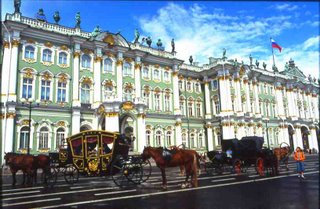
“So,” I said to Dana after we’d been in St. Petersburg for a full day, having traveled by train from Moscow where we’d spent half a week. “How do you like St. Petersburg?”
“I like the other one better."
I knew what she meant. I felt it, too. Moscow is raw, electric, kinetic. It pulses. St. Petersburg is soft, plush, elegant. It satisfies.
Our first evening in St. Petersburg, “Peter” for short, we ate at the Café Magrib on Nevsky Prospekt, Peter’s main boulevard and social and commercial heart. On our way out, we stopped to talk with the handsome young man working the coat room. Over our spaghetti dinner (the Magrib’s menu spanned the culinary spectrum from kebabs to pasta to sushi), Dana and I had had a fun conversation that began with her asking, “How come everyone in Russia is named Alexander?”. So, when the coat room clerk introduced himself as Alexander, Dana crumpled into a fit of laughter. Alexander (whom we later dubbed "Alexander the 13th or 64th or Whatever") furrowed his eyebrows at her while she devolved into a giggling heap. Not a great way to foster international entente.
Trying to salvage the situation, I asked Alexander about himself. He was a delightful, intelligent, articulate young person, a college student, and we ended up spending almost as much time talking with him as we'd spent eating our spaghetti. Alexander the 64th spoke impeccable colloquial English, which he started learning at an early age. Since the third grade, he’d been tutored by a Russian woman who’d spent years living in London and who’d returned to St. Petersburg to teach English. I asked him about his plans, about what he wanted to do when he got older, and he talked about literature, math and economics. He was interested in everything. Indeed, the varnished coat room counter in front of him was piled with books on a range of subjects. Most were open, so, between interruptions by coat room patrons, he'd been devouring them simultaneously.
He asked us about America, about life in American cities, about Boston, the nearest metropolis to our home, then about everyday life in our suburban neighborhood. Had we stayed longer, he probably would have coaxed me into describing the contents of our kitchen cabinets. He did ask about the cars in our garage and where they were made. "Germany?" he asked. He might as well have said, "Mercedes?" He thought we were rich because we traveled. "No, Japan. And Detroit."
He turned the conversation back to his motherland. “So," he asked, "how did you come to be in Russia?” Like other Russians we'd met, he seemed impressed and pleased that we’d come not on business or with an agenda, but just to see the country as tourists. Our currency rose enough to make up for the unexplained laughing fit.
“So, you have been to Moscow. And St. Petersburg. Which do you like better? Which is more beautiful?"
The cities have been rivals since Russia's creation, so this was a loaded question. Alexander leaned his head out of the coat room booth, rested his elbows on the polished wood counter, held his chin in his hands, and waited. In his question was my answer.
“St. Petersburg,” I said, “is more beautiful. But Moscow is bigger, more exciting. Both cities are wonderful, but in different ways.”
He liked that. "Yes. That is it." He discussed the merits of each and ended by attributing their respective characters and ambience to size: "They have ten millions of people. We have only three or four."
He leaned back, keeping his chin in his hands, and said, “Please. I hope you will come back to eat tomorrow. I hope I will see you tomorrow.” We had 12 meals in St. Petersburg, nearly half of them at the Magrib.
(photo: The Hermitage, St. Petersburg)
www.LoriHein.com
